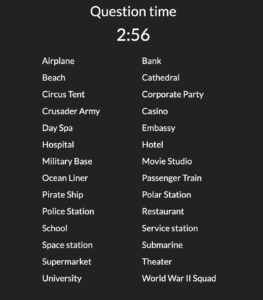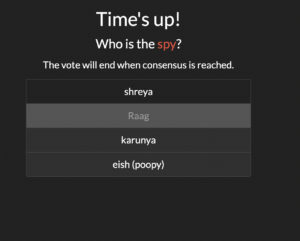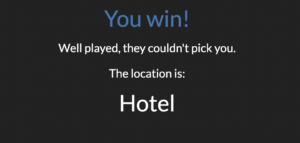For this analysis I played Spyfall with 4 of my friends. Spyfall is deception game created by Alexander Ushan and is targeted towards 3-8 players 13 years of age and over. The publishers HobbyWorld market it as a ‘hilarious party game unlike any other’. Here are the official rules from their website:

All players, except one, get cards with the samelocation while one player, the Spy, gets a list of possible locations on their screen. Players then take turns asking each other discreet questions about the location with the goal of weeding out the spy. However, these questions have to be discreet so as to not let the Spy know what the location is. At the end of the round players take a vote and if the Spy is voted out they lose. However, the Spy has a chance to save themselves by guessing the location correctly, upon with they win the game.

I thought that the confluence of a multiplayer co-op game in the context of weeding out a single imposter was really interesting because games like that are typically built on trust while in this particular game trust was established with wit and deception. I also think the zero-sum aspect of it became very evidently imbalanced in the size of the group we played in. In a large group of 8 or 10 players maybe, it makes sense that 3-4 questions in the Spy has narrowed down their options by some amount. However, I played this game with 4 players total, giving the Spy exactly 3 questions to figure out the answer. 3 generic (such as ‘Does this place allow children’) questions later, the Spy can still be left with half the places on their list as options.

While I enjoyed this game, I think games like mafia that are more easily adaptable to different group sizes by nature of not having required common knowledge such as the locations in Spyfall, are more effective at doing exactly the same thing. The loose roles and customizability of mafia really adds the appeal of it being a game for large gatherings and I think that appeal is a little lost with Spyfall when you have to pull up a list of locations that eventually become predictable and entail the same 6 questions every time the same location is in play. Mafia also has so much more room for creativity and I think the ‘questioning’ objective of Spyfall is a little limiting.
While the game was fun, it felt like the sort of muted corporate filler game I played at some of my internships over Zoom. It’s missing the sort of core personality that other games like Taboo might provide.
There’s probably a few changes I would make to the game to make it more ‘fun’
- For starters I think the number of location options should be proportional to the number of people playing so that a group of 3 has the same experience as a group of 8.
- I wonder if Monopoly-style locations customized to specific geographic regions would allow people to refer to local contexts and personal stories, making the game a little more personal and exciting. Player generated maybe?
- The game is too skewed towards non-spies. It becomes more than evident when one person is having a hard time coming up with a specific-ish question. What if the game involved an arbitrary unknown number of spies and the goal was to weed out at least half of them?
- Questions work but how about switching up the hints? Songs, single words, images or other stimuli that allowed more room for variability and creativity might spice up the game a little.



